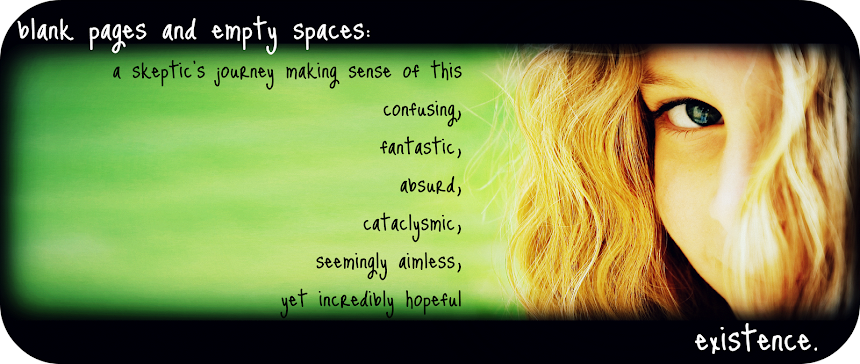Below is the Nietzsche passage I chose to respond to. My response was a bit rushed, but I wrestle with some questions that I have been really thinking about throughout this semester, how good and evil does not necessarily draw clear black and white lines, and how many times Christians fail to wrestle with the known unknowns in this life. Why do we do this? Are we just afraid to admit the truth (or the unknown truths, or the known unknown truths) and we want to put on an image that we have it all together? Why can't we just admit that we have absolutely no idea what the hell is going on? That is my question.
“How could something arise from its opposite? Truth from error, for example? Or the will to truth from the will to deception? Or altruism from egoism? Or the wise man’s pure, radiant contemplation from covetous desire? Such origination is impossible; whoever dreams of it is a fool, or worse; those things of highest value must have a different origin, their own; they cannot be derived from this perishable, seductive, deceptive, lowly world, from this confusion of desire and delusion! Rather, their basis must lie in the womb of existence, in the imperishable, in the hidden god, in the “thing in itself”-and nowhere else!...For may there not be doubt, first of all, whether opposites even exist and, second, whether those popular value judgments and value oppositions upon which metaphysicians have placed their seal may be no more than foreground evaluations, temporary perspectives, viewed from out of the corner perhaps, or up from underneath, a perspective from below (to borrow an expression common to painters)? However much value we may ascribe to truth, truthfulness, or altruism, it may be that we need to attribute a higher and more fundamental value to appearance, to the will to illusion, to egoism and desire. It could even be possible that the value of those good and honored things consists precisely in the fact that in an insidious way they are related to those bad, seemingly opposite things, linked, knit together, even identical perhaps. Perhaps! But who is willing to worry about such dangerous Perhapes?...” Nietzsche, Beyond Good and Evil
My Response
The fullness of something is known more clearly through its opposite. An understanding of hunger doesn’t fully arrive without starvation to confront it. One might experience fullness, but if fullness is known without the knowledge of deprivation and malnutrition, one cannot know the joy and thankfulness of a full stomach. Whatever we assign truth to, we must wrestle with its opposing front. It was Paul who said “What shall we say then? Are we to continue in sin that grace may abound?” in Romans 6. There was not a question in his mind that sin caused grace to be known more fully.
If humans had never fallen; if they had never eaten of the tree of knowledge of good and evil, how would they have known good or evil? Many Christians say they life was “perfect” and all they knew was “good”. The tree was not the knowledge of evil, but the knowledge of both good and evil. Humankind once did not know morality as we understand it. Perhaps they did not know opposites because altruism and egoism would simply be realities, not categorized under any particular moral type. Contemplation and desire would have been one and the same. There would be no distinction of morals, of truth from untruth, of the knowledge of something being good and another being evil. So did good and evil still exist without their knowledge of it? What of sin and grace? If they knew not what sin was, without any conception of evil, they also did not know grace. God’s grace is manifest through our trail and suffering. It abounds in our sin. One could not know sin without knowing grace, and vice versa.
Christians in America (and I suppose around the world) often do not understand the beauty of sex because it is lost in the mix of self-help books, sermons warning against the consequences of sexual immorality, crisis pregnancy centers, and condoms thrown at them at school from age nine. This is the one folly of allowing tradition and human perception to scour God; it eliminates the beauty of what God deems good. It makes evil of good. Sometimes we focus so much on the consequences and sinfulness of our state that we fail to see the beauty surrounding us despite our sin. Who is willing to have a sex revolution at church? Who is willing to confront, preach, and grapple with what is so sacred and good, when today it is seen so scandalized and lustful? Who is willing, as Nietzsche asks, to worry about the dangerous perhaps: that one thing that may be entirely wrong can also be right? Little try to confront it, and even the well-meaning minority who do, don’t know how. They create seven steps to sexual purity and try to make a complex human condition easier to compartmentalize when it simply cannot be constructed this way. The human condition with all its desires and contemplations wants and needs, sins and graces, altruisms and egoisms, cannot be confronted this way.
The joy of postmodernism is that it wrestles with the dangerous “perhaps”. It understands that life is more than opposites and self-helps, that God is more complex than our understanding can contend with and that He is not a God of to-do lists and to-not-do lists, but the God of grey areas as well. May we all come to consider that-perhaps-our Christian perceptions of reality isn’t always what is true, but we have to struggle with a grey God, a God of dialectics, opposites, a God of Nietzsche and a God of Paul. For what would be true setting aside morality, what was our reality before the Fall, when we did not know good or evil?




No comments:
Post a Comment